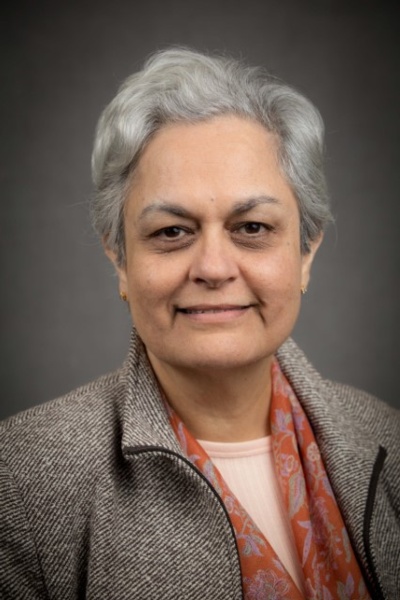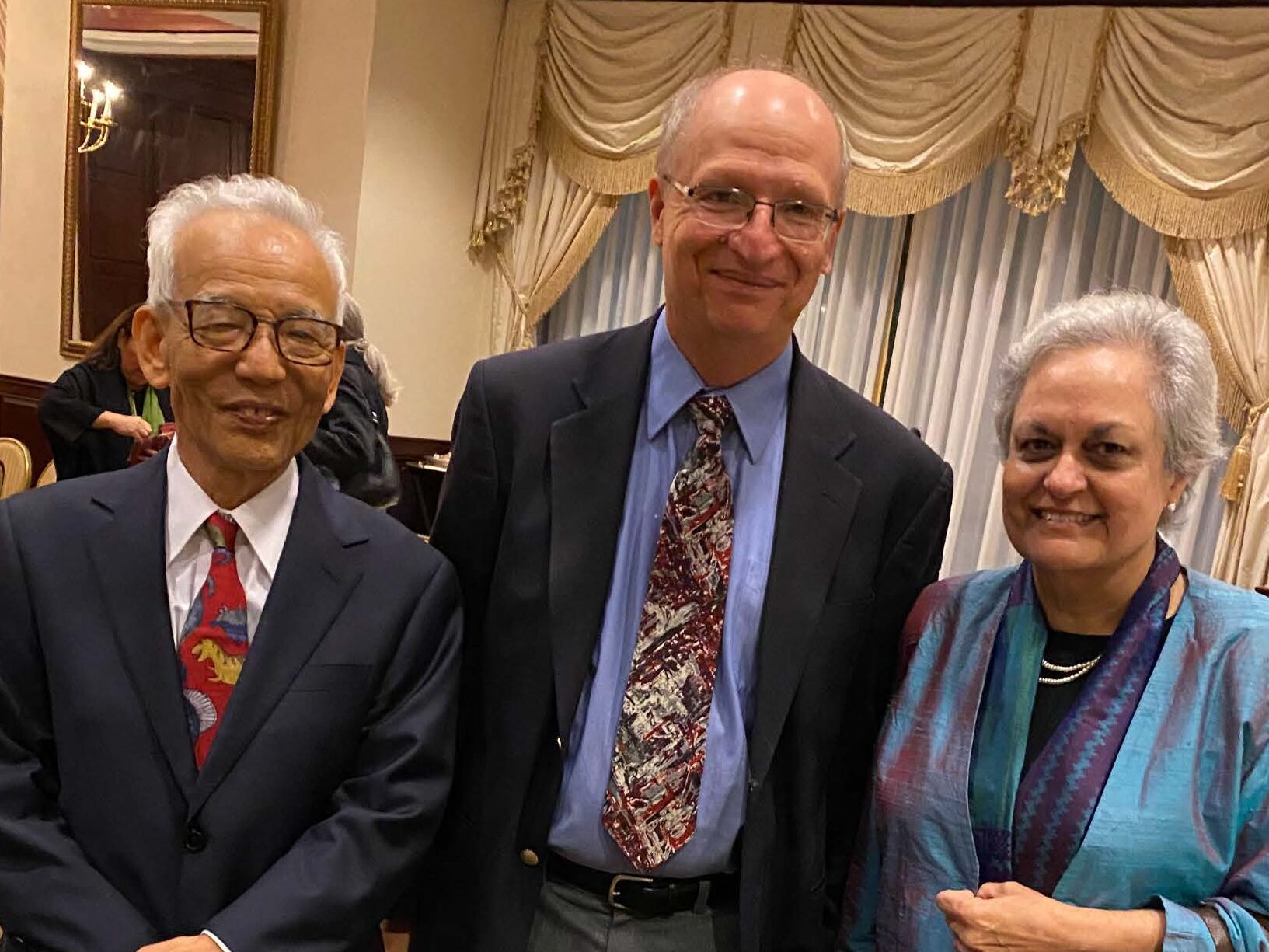
Anjuli Bamzai took up the position of AMS President January 28, 2024, at the 104th Annual Meeting of the American Meteorological Society. In her day job, she is a Senior Science Advisor on Global Climate Change in the Directorate for Geosciences at the National Science Foundation (NSF). She has also worked for the National Oceanic and Atmospheric Administration’s Office of Atmospheric and Oceanic Research and the Department of Energy’s Office of Science. Dr. Bamzai has served as an Embassy Science Fellow in Seoul, South Korea, and Cairo, Egypt; as the U.S. Government reviewer for the IPCC AR4; and on the National Climate Assessment and Development Advisory Committee for the third National Climate Assessment. Among other degrees, she has earned PhDs from George Mason University and the Indian Institute of Technology. Read her bio here.
We spoke with our new AMS President about her history, influences, and what to expect at next year’s Annual Meeting in New Orleans!
You have a physics/math background; what drew you to the applied/atmospheric sciences?
In 1927, my maternal grandfather received a scholarship from the then Maharaja of Kashmir to study civil engineering at Harvard University. He was inducted to Tau Beta Pi in 1929. He returned to Kashmir, and rose to be the chief engineer of the state—quite an influential person in his own right in terms of planning and building the infrastructure in the region in the 1930s–50s. Growing up, he was a big influence in our lives in terms of discipline, rigor and the value of education. He actively encouraged his daughters, and later his granddaughters, to pursue higher education. As I entered college, meteorology was not uppermost on my mind; I was fascinated by physics, although of course, meteorology could be considered as physics applied to the atmosphere, ocean, and other Earth System components. All along I was interested in the environment, particularly the upper atmosphere; in the 1980s and 90s ozone stratospheric chemistry received huge attention. The Montreal Protocol was signed in 1989 and decades later, we are reaping the benefits and witnessing the healing of the ozone layer.
As for weather-related childhood experiences, in 1961 when I was in elementary school there was disastrous flooding in the city of Pune, which was close to the town we lived in. Incessant rains for a couple of weeks caused the Panshet dam to burst due to a breach in the construction of its wall; waters fed into Khadakwasla dam that breached as well.
I remember that day vividly. They let us out of school early; they said the dam had burst and there was flooding. We thought we’d go back home and find our homes just gone. Turned out Khadakwasla where I lived was on higher ground. We could see the breach in the second dam and red, muddy waters of those floods … moving toward the city of Pune and its hapless residents who were caught completely off guard. We had no school for several weeks. A lot of people in Pune faced a lack of drinking water, most of the bridges were destroyed. Several decades later, on my first day at NSF, I met the program director in Hydrological Sciences, Doug James. When he learnt I had lived in Pune, he asked me about the floods. I discovered he had actually come to Pune to study this rainfall event with colleagues at the Central Water Research Institute. It was an outlier event not just in my memory, but for the city and researchers across the globe like Doug!
You often talk about the value of inclusivity in the weather-water-climate enterprise. What are some of the challenges we face in that respect, and how can AMS help?
It’s about creating a welcoming and nurturing space for people who want to participate but may otherwise be facing challenges, be they lack of opportunity thus far, inherent biases in our system and/or individual biases. The aspirational goal is to make our field more attractive so we tap into the talent that is out there. The onus is on each of us to make it attractive, to share our experiences and achievements as well as disappointments.
People make career choices about what direction to take. How do we make the whole weather-water-climate professional ecosystem an attractive proposition to them? First of all I think the atmospheric and related sciences is in itself so interesting. It goes all the way from ivory tower to use-inspired, to application, to services, to tech development … We need exit ramps for people to leave and come back again. Increasing diversity is not only about gender diversity, important as that is. There are so many divides, e.g., rural-urban, socio-economic, minority and underrepresented groups. How do we ensure pathways to fuller participation? There’s also tension between foreign talent and the neglect in nurturing talent within this country. For example, we’re finding that smaller institutions, minority-serving institutions, smaller HBCUs oftentimes don’t have the infrastructure or ready access to federal resources. We had interesting sessions on the topic of broadening participation of the weather, water and climate enterprise at the 104th AMS Annual Meeting at Baltimore.
I want to understand and learn from the DEI assessment that AMS is undertaking. We have to be mindful that each of us is coming in with our own set of experiences. It’s challenging, but I believe that we need to keep striving doggedly with perseverance to create opportunities everywhere, innovation anywhere.
Who are some people who’ve influenced you and your leadership style?
We stand on the shoulders of those who went before us. People I admired like Drs. Joanne Simpson and Rita Colwell. They had the grit and determination to keep paving the way, just like the Honorable Justice Ruth Bader Ginsburg! They are right there at the top for early-career women to read about and draw inspiration from. Dr. Colwell was the first female Director of NSF. Last year, I was thrilled to receive an email of congratulations from her when I became President-Elect of the AMS. She recently authored the book, A Lab of One’s Own: One Woman’s Personal Journey Through Sexism in Science. Prof. Jim Fleming has written the book, First Woman: Joanne Simpson and the Tropical Atmosphere; it describes the life of Dr. Joanne Simpson and the challenges she overcame to achieve spectacular heights, pun intended!
When I came to the United States I was fortunate to train/work with Dr. Jagadish Shukla and his group at the Center for Ocean-Land-Atmosphere Studies. Dr. Shukla’s adviser at MIT was Dr. Jule Charney, his advisor was Dr. Carl-Gustaf Rossby. As I look back, it was amazing how I benefited from interacting with the top-notch scientists in our field like Dr. Suki Manabe, who shared the Nobel Prize in Physics a few years back with two other climate scientists. I had the good fortune that my life intersected with such amazing people.

When I joined the government, I had the opportunity to work with some of the best, who were really visionary. For example, Jay Fein, who passed away in 2016, set up some very big, ambitious projects like the Community Earth System Modeling project at NCAR. Ari Patrinos at DOE, Bob Correll at NSF, and Mike Hall at NOAA. I learnt something from each of these larger-than-life people in our field. I know it’s not all about luck, but having said that, I have been fortunate that I did meet some of the greatest.
In India, my first advisor was kind of a renaissance person as well. He taught me to think big and bold, to seize opportunities from the world but also give back to society when the opportune moment arrives. To be strong about your convictions and proud of your achievements while at the same time being humble. I guess that was the culture that I came from. Certainly one should be assertive and one should speak candidly, while at the same time be open to learn and correct based on feedback. I think that if you let the arrogant side of your nature overcome you, then you’re going to stop learning, you’re going to stop keeping an open mind.
What are some of your priorities for your term as president, and for the AMS as a whole?
At AMS, we all come together as a Society because of a common kinship. For me, sustaining and enhancing a sense of camaraderie and networking amongst the various constituencies is a priority. Within and between the silos of science, practice, or services, there needs to be a lateral sharing of experiences through meetings and/or other events, through our publications. I would want to continue to enhance this so it results in a rich ecosystem which is attractive for the next generation.
The AMS has certain expertise to offer society, and we need to capitalize on the strengths of the AMS for society at large. How do we propagate that value chain through the various jigsaw pieces of an enterprise that is so large, and how do you put the puzzle pieces together so it yields successful outcomes?
The AMS community draws its historical lineage from the atmospheric and related sciences. However, we now know that the atmosphere is just one very important component of the Earth system, interacting with the ocean, the land, ecosystems, geology, and human systems. Understanding and responding to the system on a host of spatial and temporal scales is the grand challenge of our times. That’s the theme of the 2025 AMS Annual meeting in New Orleans. My theme is entitled, “Toward a Thriving Planet: Charting the Course Across Scales.” So local, regional, and global scales, from the weather/hydrology to climate. The state of Louisiana and the Gulf region are confronting problems such as loss of wetlands … so hopefully we will consider those issues a bit, engaging with the local community.
I know it sometimes feels like unprecedented climate and environmental changes have already descended upon us and it is a hopeless situation. I think we still have to steady ourselves and think objectively about, what can we do best, and how can we contribute with our expertise, our talent pool and resources at hand. We can’t wish these problems away, neither will they be resolved right away. We need innovation, creative thinking, and sound solutions.